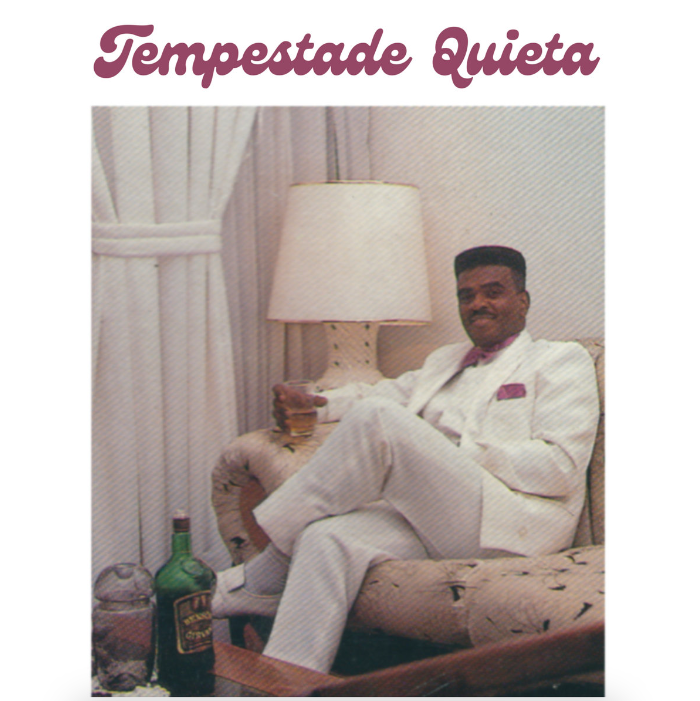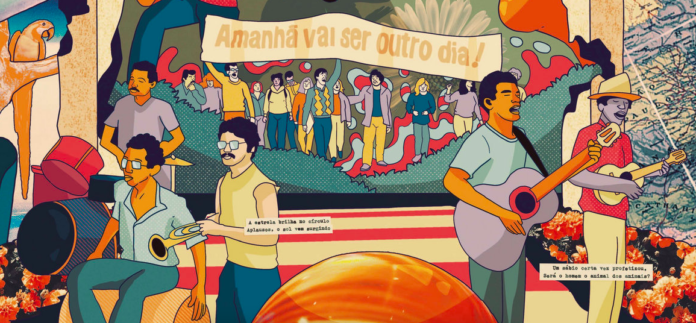During a trip to DC, a friend gifted me a copy of a 2021 mixtape called Tempestade Quieta: An Imagined Brazilian Quiet Storm Pirate Radio Transmission. On it, an imagined DJ named Voz da Madrugada (which translates to “Voice of the Dawn”) presents Brazilian songs with “slow sexy tempos” and “an eschewing of social and political commentary in favor of romantic themes.”
DC native and radio personality Melvin Lindsey pioneered this sexy, sonically diverse, and unforgettable radio concept in the 1970s on Howard University’s WHUR 96.3 FM, naming it “Quiet Storm.” Packed neatly in an hour of music, the tracks on Tempestade Quieta could easily pass for the U.S. songs that still play every night on the station.

Maryland native and creator of Tempestade Quieta Tee Cardaci is a DJ and producer who has been living in Rio de Janeiro for the past 15 years. On his releases, he serves as an apt bridge between the DC area and Brazil. After Tempestade Quieta dropped, Cardaci curated an mixtape he dubbed Sonhos Secretos. The two projects share a similar theme: deep-cut, cross-genre singles that Cardaci rescued from oblivion through years of crate digging.
Turns out, Sonhos Secretos was originally intended for Cardaci’s inner circle. It compiles privately pressed, obscure singles from 1980 to 1985 that he dug out of second-hand shops and warehouses in Rio.
“I recognized these as being special records. They meant a lot to the person that made them. They represented their dreams, which is kind of where the title, Sonhos Secretos, or ‘Secret Dreams’ in English, comes from,” explained Cardaci in an interview with online audio journal Aquarium Drunkard. After the mixtape was published by the same site, Cardaci was contacted by Org Music, a Los Angeles-based label that offered to release Sonhos Secretos as an LP.
But this was an issue: Cardaci had no way of knowing how to get in touch with a lot of these little-known musicmakers. He spent the next three years hitting up journalists, friends, and music forums in the hope of contacting the musicians that comprised the final version of Sonhos Secretos.
“Trying to discern who played on Brazilian records can be difficult under the best of circumstances, as Brazilian artists had this weird habit of only using first names in the credits or, even worse, nicknames. I can’t tell you how many sleepless nights I spent trying to figure out who these guys were and how to get in touch with them,” said Cardaci.
Though at times fraught, this exhaustive fieldwork led to emotional meetings with some of the musicians. Operating outside of the Brazilian music industry, and often with limited resources, the people behind the singles and B-sides that make Sonhos Secretos rarely saw their songs gain any major airplay or recognition.
“My real reward came when I finally was able to get these artists on the other end of the phone to tell them that I’d found their record and loved what they’d created enough to want to reissue it on my compilation. With many of them, you could feel the emotion through the phone. I mean, imagine you put your heart and soul into creating something you truly believe in. You sell some copies at your shows in local bars, hand them out to friends and family and then it sort of disappears into the ether of time only to have some random gringo record nerd call you out of the blue 40 years later,” said Cardaci.
Much like the strange, dreamlike songs that made up Tempestade Quieta, the tracks on Sonhos Secretos—which did indeed come out as an LP via Org Music in August—are hard to classify. Loosely categorized as música popular brasileira, or Brazilian popular music, Sonhos Secretos soars above what American audiences might recognize as art rock, post-bossa nova, jazz fusion, and even baroque pop.
Opening with flawless finger-picked guitar that gives the track a theatrical, slow-burn quality, “Rainha dos Conflitos [Queen of Conflicts]” speaks of suffering on planet Earth, a prophecy, and mortality, ending with an almost spiritual chorus that adds to the mixtape’s overall mystery. With its glossy keys and cheery backing vocals, “Sinal Fechado [Closed Sign],” a pop song credited to Carlos Souto and the B-side of an album called “Esquina do Amor [Corner of Love]”, twists the playlist from psychedelic to hit radio. Through existential lyrics and elaborate arrangements, songs like “Trem Fantasma [Ghost Train]” and “Confissões de Um Retrato Falado [Confessions of a Spoken Portrait]”, with funky guitar and bass licks, bring the vibe back to a mix of modern jazz and sophisticated ’80s pop. ARP synthesizers, rhodes, congas, chimes, and saxophones all have their place on Sonhos Secretos.
Composed during the end of Brazil’s brutal military dictatorship, which ran for 21 years between 1964 and 1985, the music on Sonhos Secretos serves as a testament to the ability artists have to create in the face of oppression and censorship. The musicians that made the songs in Sonhos Secretos dared to imagine more, and their sounds are now reaching a new audience. Their dreams, inasmuch as they are present in their music, remain brilliant and intact.







